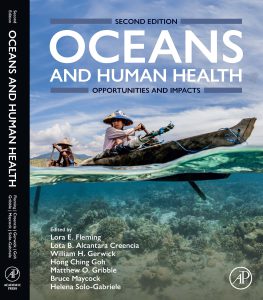Highlights
- A second edition of the book Oceans and Human Health: Opportunities and Impacts has been released, addressing benefits, opportunities, risks, and impacts resulting from the relationship between oceans and humans, informed by more than 100 international authors.
- It identifies and links necessary tools to relevant disciplines for action, provides illustrative international case studies, and covers scientific, socioeconomic, political, and ethical analyses behind the latest ocean and human health research.
- Academics from the University of Florida Food and Resource Economics Department have co-authored a chapter that explores the topic of measuring human well-being.
‘As World Ocean Day rallies the world for ocean and climate action today (June 8), the launch of Oceans and Human Health: Opportunities and Impacts, Second Edition couldn’t be more relevant or urgently needed.’

More than 100 international authors have come together to explore the interconnected and complex relationship between the health of both the oceans and humans.
“For thousands of years, the coasts, seas and Ocean have supported our health and well-being — now it is time to give back and truly care for the health of the Ocean,” said Lora Fleming, founder of the European Centre for Environment and Human Health who is also professor and chair of oceans, epidemiology and human health at the University of Exeter Medical School and one of the editors for the book. “It has been a privilege to work with such an esteemed, committed and interdisciplinary team of experts from around the world on this book. We all care deeply about the future of ocean stewardship and through better understanding of the issues, global populations can unite to nurture and promote our life-enhancing relationship with the oceans.”
This body of work comes at a time when the pressing issues of biodiversity and human health are at the forefront of the global agenda. International leaders have recently made a commitment to conserve 30% of our lands, waters, and ocean by 2030 (an initiative known as 30×30), and the United Nations declared this as the Ocean Decade.
In this context, the chapters provide vital scientific evidence to underpin activities and decision-making in education, policy and communities. A group from the UF/IFAS food and resource economics department – Christa Court, assistant professor; Robert Botta, post-doctoral associate; and Roberto Koeneke, Ph.D. student — contributed to one such chapter that explores impacts on coastal communities.
“The interconnected nature of oceans and human systems requires an interdisciplinary approach, not only for understanding the relationships at hand but for affecting positive change when issues have been identified,” said Christa Court, assistant professor of Food and Resource Economics at the University of Florida said. “Whereas a marine biologist and a phycologist can explain the role of naturally occurring algae in ocean ecosystems, they cannot measure the impacts that overstimulated growth of these algae might have on coastal economies. That’s where an economist might come in. Economists can also help with determining the value of ocean-related ecosystem services such as carbon storage, biodiversity, and even the provision of recreational opportunities.”
In Chapter 20, Court and her colleagues explore how measures of well-being can be combined with objective measures of ecosystem goods and services to provide a more well-rounded picture of the overall vitality of a region.
“As just one example, human health can be threatened when nutrient enrichment influences harmful algal blooms that might have respiratory or gastrointestinal impacts,” Court said. “Human interactions with oceans are also known to positively influence physical and mental wellbeing. Understandings of how humans influence the health of the ocean and how the ocean can in turn influence human health are critical for long-term viability and compatibility of both systems.”
More information Oceans and Human Health: Opportunities and Impacts, Second Edition – European Centre for Environment and Human Health | ECEHH
To order Oceans and Human Health – 2nd Edition (elsevier.com)
#
This article was contributed to by Philippa Mina, University of Exeter. For any book-level media or communications requests, please contact her at P.Mina@exeter.ac.uk
 0
0
